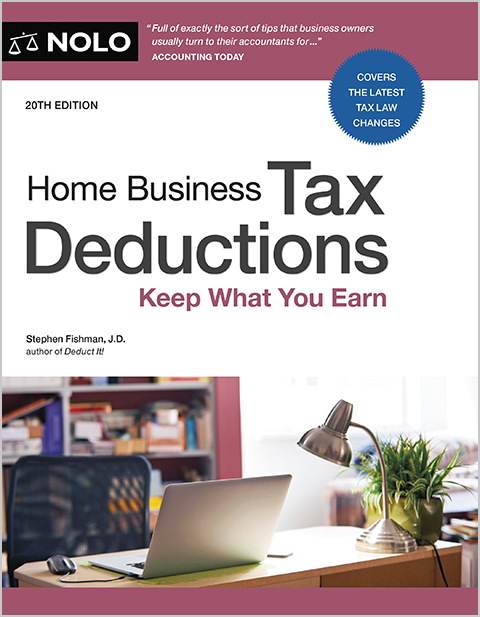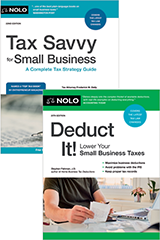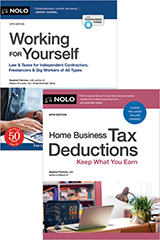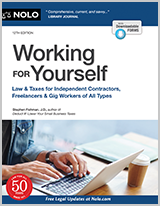New Edition!
Home Business Tax Deductions
Keep What You Earn
- Product Details
- start-up costs
- vehicles, meals, and travel expenses
- medical expenses, and
- retirement expenses.
- About the Author
- Table of Contents
- How Tax Deductions Work
- How Businesses Are Taxed
- What Businesses Can Deduct
- Adding It All Up: The Value of Tax Deductions
- Businesses That Lose Money
- Annual Dollar Limit on NOL Deduction
- Proving That You Are in Business
- Tax Consequences of Engaging in a Hobby
- Investing and Other Income-Producing Activities
- What Are Start-Up Expenses?
- When Does a Business Begin?
- If Your Business Doesn’t Last 15 Years
- Expenses for Businesses That Never Begin
- Avoiding the Start-Up Tax Rule’s Bite
- Requirements for Deducting Operating Expenses
- Operating Expenses That Are Not Deductible
- Operating Expenses Paid With Paycheck Protection Program Loans
- How to Report Operating Expense Deductions
- Long-Term Assets
- Deducting Inexpensive Property: The De Minimis Safe Harbor and Materials and Supplies Deduction
- General Rules for Deducting Long-Term Personal Property
- Bonus Depreciation
- Section 179 Deductions
- Deducting Repairs and Improvements
- Regular Depreciation
- Deducting Business Vehicles
- Tax Reporting and Record Keeping
- Leasing Long-Term Assets
- Qualifying for the Home Office Deduction
- Corporation Employees
- Calculating the Home Office Deduction
- Simplified Home Office Deduction Method
- IRS Reporting Requirements
- Audit-Proofing Your Home Office Deduction
- You Must Have a Pass-Through Business
- You Must Have Qualified Business Income
- You Must Have Taxable Income
- Deduction for Taxable Income Up to $182,100 ($364,200 if Married)
- Deduction for Income Above $182,100 ($364,200 if Married)
- Taking the Pass-Through Deduction
- Strategies to Maximize the Pass-Through Deduction
- Deductible Local Transportation Expenses
- The Standard Mileage Rate
- The Actual Expense Method
- Tax Credits and Deductions for Electric Vehicles
- Other Local Transportation Expenses
- Reporting Transportation Expenses on Your Tax Return
- When Clients or Customers Reimburse You
- What Is Business Travel?
- Deductible Travel Expenses
- How Much You Can Deduct
- Maximizing Your Business Travel Deductions
- Travel Expenses Reimbursed by Clients or Customers
- What Is Inventory?
- Deducting Inventory Costs
- Employees Versus Independent Contractors
- Tax Deductions and Credits for Employee Pay and Benefits
- Employing Your Family or Yourself
- Tax Deductions When You Hire Independent Contractors
- The Affordable Care Act (ACA)
- The Personal Deduction for Medical Expenses
- Deducting Health Insurance Premiums
- Sick Leave and Family Leave Tax Credits for the Self-Employed
- Tax Credits for Employee Health Insurance
- Health Reimbursement Arrangements
- Health Savings Accounts
- Why You Need a Retirement Plan (or Plans)
- Individual Retirement Accounts (IRAs)
- Employer IRAs
- Keogh Plans
- Solo 401(k) Plans
- Advertising
- Business Bad Debts
- Casualty Losses
- Charitable Contributions
- Dues and Subscriptions
- Education Expenses
- Entertainment and Meals
- Gifts
- Insurance for Your Business
- Interest on Business Loans
- Legal and Professional Services
- Taxes and Licenses
- What Is Cryptocurrency?
- Why You Might Want to Use Cryptocurrency in Your Business
- Tax Treatment of Cryptocurrency
- IRS Reporting of Cryptocurrency Transactions
- Record Keeping for Cryptocurrency Transactions
- Accounting for Cryptocurrency Transactions
- How to Report Cryptocurrency Revenue to the IRS
- What Records Do You Need?
- Records of Your Income and Expenses
- Records Required for Specific Expenses
- How Long to Keep Records
- What If You Don’t Have Proper Tax Records?
- Accounting Methods
- Tax Years
- An Employer-Employee Arrangement
- Establish a Qualified Joint Venture
- Form a Business Entity
- Do Nothing
- Tip #1: Be Thorough and Exact
- Tip #2: Don’t File Early
- Tip #3: File Electronically
- Tip #4: Form a Business Entity
- Tip #5: Explain Items the IRS Will Question
- Tip #6: Avoid Ambiguous or General Expenses
- Tip #7: Report All of Your Income
- Tip #8: Watch Your Income-to-Deduction Ratio
- Tip #9: Beware of Abnormally Large Deductions
- Sample Chapter
- a portion of your rent or mortgage
- expenses for local and business trips, and
- medical expenses for yourself and your family?
For any home business, claiming all the tax deductions you are entitled to is essential to your business’s financial success. Don’t miss out on the many valuable deductions you can claim.
Here, you’ll find out how to deduct:
Easy to read and full of real-life examples, this book can help you take advantage of all the valuable deductions you are entitled to. You’ll also learn how to keep accurate, thorough records in case the newly beefed-up IRS comes calling.
“Full of exactly the sort of tips that business owners usually turn to their accountants for …”—Accounting Today
“Whether you’re going to start or have already started your business, you need this book.”—Paul Tulenko, Syndicated Business Columnist
Introduction
1. Some Tax Basics
2. Is Your Home Business Really a Business?
3. Getting Your Business Up and Running
4. Home Business Operating Expenses
5. Deducting Long-Term Assets
6. The Home Office Deduction
7. The Pass-Through Tax Deduction
8. Getting Around Town: Car and Local Travel Expenses
9. Leaving Town: Business Travel
10. Inventory
11. Hiring Help: Employees and Independent Contractors
12. What If You Get Sick? Deducting Medical Expenses
13. Deductions That Can Help You Retire
14. More Home Business Deductions
15. Using Cryptocurrency in Your Business
16. Record Keeping and Accounting
17. Businesses Owned by Spouses
18. Nine Tips for Avoiding an IRS Audit
Index
Introduction
This book is for you if you’re one of the millions of Americans who run a business from home. It shows how home business owners can reduce their taxes by taking advantage of the huge array of tax deductions available to them.
Did you know that, if you have a legitimate home business, you might be able to deduct:
All of these deductions—and many others—can add up to substantial tax savings. The IRS will never complain if you don’t take all the deductions available to you. In fact, the majority of home business owners miss out on many deductions every year simply because they aren’t aware of them—or because they neglect to keep the records necessary to back them up.
That’s where this book comes in. It shows you how you can deduct all or most of your business expenses from your federal taxes. This book isn’t a tax preparation guide—it doesn’t show you how to fill out your tax forms. (By the time you do your taxes, it might be too late to take deductions you could have taken if you had planned the prior year’s business spending wisely and kept proper records.) Instead, this book gives you all the information you need to maximize your deductible expenses—and avoid common deduction mistakes. You can (and should) use this book all year long, so that you’re ready to take advantage of every available deduction opportunity come April 15.
Now, more than ever, you’ll need guidance when it comes to under- standing your taxes. In 2017, Congress enacted the most sweeping changes to the tax code in over 30 years when it passed the Tax Cuts and Jobs Act (TCJA), which took effect in 2018. Then, to stave off economic devastation in the wake of the coronavirus 2019 (COVID-19) pandemic, Congress revised the nation’s tax laws yet again for 2020 and 2021, temporarily suspending many of the harshest provisions of the TCJA. In 2022, most of these temporary measures ended, and Congress enacted the Inflation Reduction Act. This act, among other things, expanded tax benefits for electric vehicles and green energy and substantially increased funding for the IRS.
Even if you work with an accountant or another tax professional, you need to learn about home business tax deductions. No tax professional will ever know as much about your business as you do, and you can’t expect a hired professional to search high and low for every deduction you might be able to take, especially during the busy tax preparation season. The information in this book will help you provide your tax professional with better records, ask better questions, and obtain better advice. It will also help you evaluate the advice you get from tax professionals, websites, and other sources, so you can make smart decisions about your taxes.
If you do your taxes yourself (as more and more home businesspeople are doing, especially with the help of tax preparation software), your need for knowledge is even greater. Not even the most sophisticated tax preparation program can decide which tax deductions you should take or tell you whether you’ve overlooked a valuable deduction. This book can be your guide—providing you with practical advice and information so you can rest assured you are taking full advantage of the many deductions available to home business owners.
We hope you enjoyed this sample. The complete book is available for sale here at Nolo.com.




